Article contents
The Origin of The Use of an and Ke In Indefinite Clauses
Published online by Cambridge University Press: 11 February 2009
Extract
Several explanations have already been put forward to account for the origin of the use of  and
and  with the subjunctive (and occasionally the optative) in indefinite relative, temporal, and conditional clauses in Greek. Therefore, before I add one more to them, it is necessary for me to give the reasons which there are for thinking that the views already put forward are unsatisfactory, and that a new explanation is required.
with the subjunctive (and occasionally the optative) in indefinite relative, temporal, and conditional clauses in Greek. Therefore, before I add one more to them, it is necessary for me to give the reasons which there are for thinking that the views already put forward are unsatisfactory, and that a new explanation is required.
- Type
- Articles
- Information
- Copyright
- Copyright © The Classical Association 1955
References
page 72 note 1 I do not propose to distinguish between the meanings of the two particles. The distinction between them seems to be one of dialect, as is recognized even by writers who point out differences between the ways in which they are used in Homer, e.g. by Chantraine, Gram. Hom., tome ii, § 503. Such differences certainly exist, but they must be merely a convention of the artificial Epicdialect, since they cannot have existed in spoken dialects which only possessed one of the particles. Therefore, when we use the Homeric poems as evidence for the usages of the living speech of the Greeks at an early period, we can safely ignore the slight difference in meaning between ![]() xand
xand ![]() .Google Scholar
.Google Scholar
page 72 note 2 Homeric Grammar, 2nd ed., § 362.
page 72 note 3 lb., §§ 275(a), 300, 324, 326(1).
page 72 note 4 lb., §§ 283(b), 287(2), 289(2), 292, 305 note.
page 73 note 5 I use the name Homer for convenience, without intending to imply any particular views on the Homeric question.
page 73 note 1 Chantraine (Gram. Hom., tome ii, § 311) follows Monro in this mistake when he says of ![]() and
and ![]() , ‘Elles soulignent un cas particulier, marquent une emphase. … La particule
, ‘Elles soulignent un cas particulier, marquent une emphase. … La particule ![]() , par exemple, exprime l'1dée de “alors, dans ces conditions”.’ He differs from Monro in a few details, but their views are in general so similar that Chantraine's must fall with Monro's.Google Scholar
, par exemple, exprime l'1dée de “alors, dans ces conditions”.’ He differs from Monro in a few details, but their views are in general so similar that Chantraine's must fall with Monro's.Google Scholar
page 73 note 2 Hom. Gram., §§ 283(b), 287(2), 289(2) (b), 292 (b).
page 73 note 3 These views on the Homeric language are so generally accepted that they hardly require references to justify them. At any rate it is sufficient to refer to Bowra's summary of the case for them in Tradition and Design in the Iliad, ch. vii.
page 74 note 1 Refs.: E 233, 5365–6, Γ 287, Γ 460, Δ 191, E33, H 171, Θ34, Θ354, Θ465, I 165–6, I 424 (unless the verb is optative), K 282, σ192, Φ103, Φ 127, χ130, ψ345, Ω119, Ω147, Ω176, Ω196, Ω382, a 396, β43, β192–3. β213, δ29, δ756–7, ζ37–38, δ202, ι356, K 288, k 432–3, k 539, λ135, μ81–82, ν364, ν400, 0 311, π349–50, ρ385, σ86–87, σ335–6. τ403–4. ψ140. ψ282, Ω29. The verb is probably future indicative at σ466–7 and ϒ23; and 8 389 is probably a main clause.
page 74 note 2 See p. 79, n. 3 below.
page 74 note 3 Refs.: 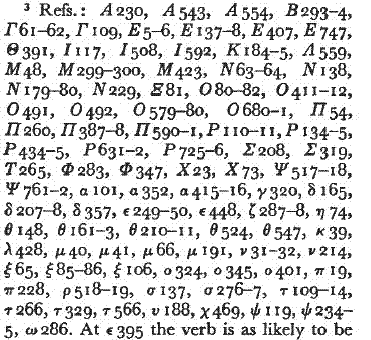 At 395 the verb is as likely to be indicative as subjunctive.
At 395 the verb is as likely to be indicative as subjunctive.
page 74 note 4 Refs.: ![]() the indicative in the second part of the clause, and the verb of the first part is unexpressed. No doubt it is to be understood in the subjunctive, but since it is not expressed I have not included this clause in the list. There is another clause with verb unexpressed at E 481.
the indicative in the second part of the clause, and the verb of the first part is unexpressed. No doubt it is to be understood in the subjunctive, but since it is not expressed I have not included this clause in the list. There is another clause with verb unexpressed at E 481.
page 74 note 5 Refs.: ![]()
page 74 note 6 Refs.: 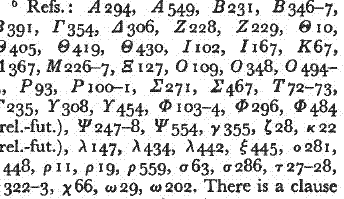 There is a clause with verb unexpressed at A 547.
There is a clause with verb unexpressed at A 547.
page 74 note 7 Refs.: 0 453, π76–77, τ528–9, v 335. Monro (Hom. Gram., § 283(a) specifically remarks that in this last case the intention behind the omission of ![]() ‘is to make the reference quite general and sweeping’. This cannot be so. The reference is to the man whom Penelope will marry, despairing of the return of Odysseus; and it seems quite obvious that she will only marry one man.
‘is to make the reference quite general and sweeping’. This cannot be so. The reference is to the man whom Penelope will marry, despairing of the return of Odysseus; and it seems quite obvious that she will only marry one man.
page 74 note 8 Refs.: 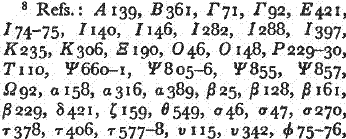
![]() There is a clause with verb unexpressed at H 286.
There is a clause with verb unexpressed at H 286.
page 75 note 1 Refs.: ![]()
page 75 note 2 Refs.: 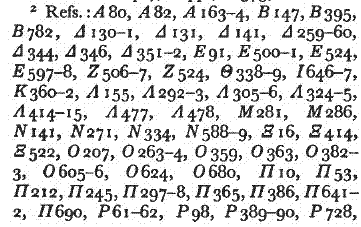
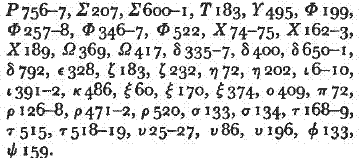
page 75 note 3 Refs.: 
page 76 note 1 Ref.: 
page 76 note 2 Refs.: ![]() less the verb is future indicative),
less the verb is future indicative), ![]()
![]()
page 76 note 3 Refs.: 
page 76 note 4 Refs.: 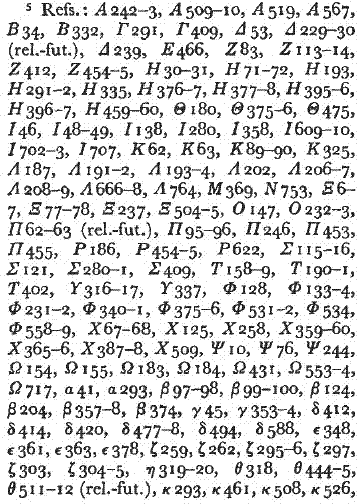
page 76 note 5 Refs.: 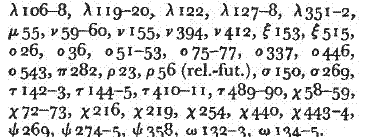
page 76 note 6 Refs.: ![]()
page 76 note 7 Refs.:  The optative is the best attested reading at ∈471.
The optative is the best attested reading at ∈471.
page 76 note 8 Refs.: 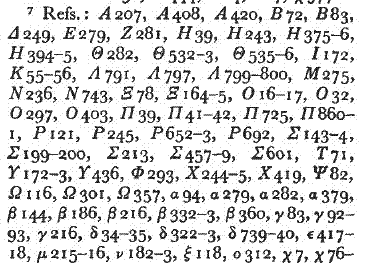
page 76 note 9 Ref.: ![]()
page 76 note 10 Refs.: ![]() The verbs are probably future indicative at A 294, B 261–3, and E 350.
The verbs are probably future indicative at A 294, B 261–3, and E 350.
page 76 note 11 Refs.: ![]()
page 76 note 12 Refs.: ![]()
![]() probably future indicative a
probably future indicative a ![]()
![]() and
and ![]()
page 76 note 13 Refs.: ![]()

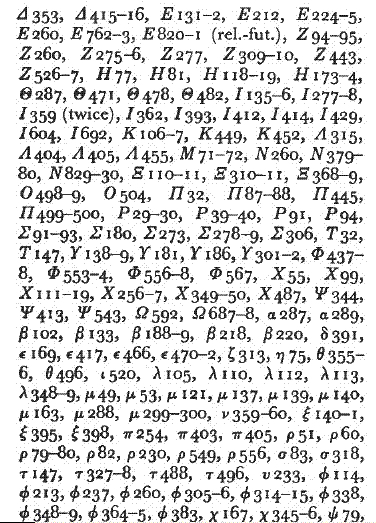
page 77 note 1 
page 77 note 2 ![]() The optative at 0404 is due to a conjecture. Perhaps is due to a conjecture. Perhaps I should also mention the indirect questions at E 85, 0423, and ρ368, although the pronouns which introduce them cannot be called ‘relative’
The optative at 0404 is due to a conjecture. Perhaps is due to a conjecture. Perhaps I should also mention the indirect questions at E 85, 0423, and ρ368, although the pronouns which introduce them cannot be called ‘relative’
page 77 note 2 Refs.: 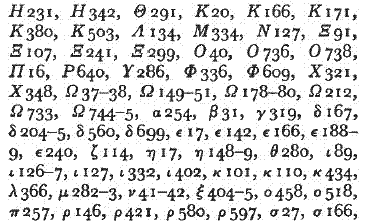
page 77 note 3 Refs.: ![]()
page 77 note 4 Refs.: 
page 77 note 5 Refs.: 
page 77 note 6 Refs.: ![]()
page 77 note 7 Refs.: ![]()
page 78 note 1 Refs.: ![]()
page 78 note 2 Refs.: ![]()
page 78 note 3 Refs.: ![]() , δ64. If the punctuation of the Oxford text is correct,
, δ64. If the punctuation of the Oxford text is correct, ![]() 218 is a main clause.
218 is a main clause.
page 78 note 4 Refs.: ![]()
page 78 note 5 Refs.: ![]()
page 78 note 6 Ref.: 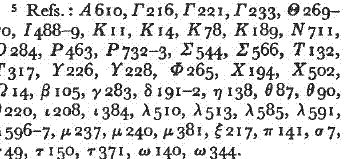
page 78 note 7 Refs.: ![]()
![]()
![]() At δ222 the manuscript reading is
At δ222 the manuscript reading is ![]() not
not ![]() .
.
page 78 note 8 Refs.: ![]() reads
reads ![]() for manuscript reading
for manuscript reading ![]() ).
).
page 78 note 9 Refs.: ![]()
page 78 note 10 Refs.: ![]()
![]() The
The ![]() clause at γ285 is probably final.
clause at γ285 is probably final.
page 78 note 11 Ref.: ![]()
page 78 note12 Ref.: ![]()
page 78 note13 Refs.: ![]()
![]()
page 78 note14 Refs.: ![]() (Here Oxford text reads subjunctive, contrary toMSS.) γ 117 is probably a main clause.
(Here Oxford text reads subjunctive, contrary toMSS.) γ 117 is probably a main clause.
page 78 note 15 Refs.: ![]()
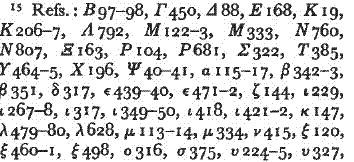 (But Oxford text reads subjunctive at ∈471–2.)
(But Oxford text reads subjunctive at ∈471–2.)
page 78 note 16 Refs.: ![]()
 The clause at π 99–101 is probably a wish.
The clause at π 99–101 is probably a wish.
page 78 note 17 Refs.: ![]()
page 78 note 18 Refs.: ![]()
page 78 note 19 Refs.: 
page 78 note 20 Ref.: ![]()
page 78 note 21 Refs.: ![]()
page 78 note 22 Ref.: ![]()
page 79 note 1 Refs.: ![]()
page 79 note 2 Refs.: 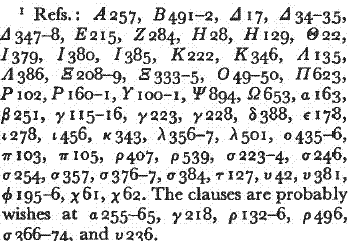
page 79 note 3 It is perhaps best not to try to strengthen my argument by referring to Homer's adverbial clauses of manner. I do not accept the view of Majnarić (Bulletin international de l' Académie yougoslave del Sciences et des Beaux Arts, ii (1931), p. 113) that in such clauses with the subjunctive, ![]() stands for
stands for  ore, because too much emendation is necessary to support it. But so many of these clauses are of a special nature, that it would not be safe to base general inferences on them; though if such inferences were to be made, they would not tell against my views. The references to these clauses are as follows: Subjunctive without
ore, because too much emendation is necessary to support it. But so many of these clauses are of a special nature, that it would not be safe to base general inferences on them; though if such inferences were to be made, they would not tell against my views. The references to these clauses are as follows: Subjunctive without ![]() or
or ![]() . Optative without
. Optative without 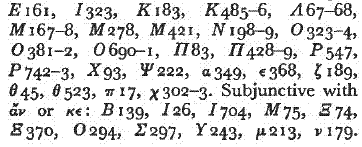 or
or ![]() : σ473. Optative with
: σ473. Optative with ![]() or
or ![]() 293, ρ 586.Google Scholar
293, ρ 586.Google Scholar
page 80 note 1 Monro, Hom. Gram., § 363, 1.
page 80 note 2 Greek Syntax, § 425.
page 80 note 3 See, for example, Schwyzer and Debrunner,Griech. Gramm., Part II, pp. 310 ff.; Kühner and Gerth, , Griech. Gramm., Part II, pp. 217 and 250; Meillet and Vendryes, Grammaire comparée des langues classiques, 2nd ed., § 933. Stahl (Synt. d. griech. Verbums, p. 258. 1) accepts this view for clauses referring to the future only (see p. 262. 2).Google Scholar
page 81 note 1 Monro, , Hom. Gram., § 275.Google Scholar
page 82 note 1 Griech. Gramm., Part II, p. 305.Google Scholar
page 82 note 3 Gramm. comp. d. lang. class., § 370.
page 82 note 1 Griech. Gramm., Part II, p. 312.Google Scholar
page 82 note 2 Schwyzer, and Debrunner, , Griech. Gramm., Part II, p. 319.Google Scholar
page 82 note 3 Synt. Forsch. i, ch. 9.Google Scholar
page 82 note 4 Griech. Gramm., § 392 Vorbemerk.
page 83 note 1 Synt. d. griech. Verbums, p. 255. 1.Google Scholar
page 83 note 2 lb., p. 258. 1.
page 83 note 3 lb., p. 258. 2.
page 83 note 4 Beiträge zur griechischen Satzlehre, p. 22.
page 83 note 5 lb., pp. 19–22.
page 84 note 1 On p. 27 he makes a similar mistake in seeing potential optatives in the protases at E 273 and V 389–91. In his translation of these passages the difficulty is obscured by an ambiguity of German similar to that which we noticed in English when discussing the view of Schwyzer and Debrunner. Musić does not, however, claim that his interpretation is certain.
page 84 note 2 Hom. Gram., § 362.
page 84 note 3 Griech. Gramm., Part II, p. 305Google Scholar. Stahl (Synt. d. griech. Verbums, p. 256. 2) rejects this view on the ground that it does not agree with the use áv and ![]() in some conditional protases. This objection falls to the ground if my views are accepted, of course.Google Scholar
in some conditional protases. This objection falls to the ground if my views are accepted, of course.Google Scholar
page 84 note 4 Moods and Tenses, § 520.
page 84 note 5 lb., § 219.
page 85 note 1 lb., § 222; Kühner, and Gerth, , Griech. Gramm., Part II, p. 246.Google Scholar
page 85 note 2 Moods and Tenses, § 428(b).
page 85 note 3 lb., § 702.
page 85 note 4 s.v. ![]() I. 1. c; or, in the 9th edition,
I. 1. c; or, in the 9th edition, ![]() , A. I. 3.
, A. I. 3.
page 86 note 1 Goodwin, Moods and Tenses, § 223
page 86 note 2 lb., § 224.
page 86 note 3 lb., § 223.
page 88 note 1 Hom. Gram., § 326. 5.
page 88 note 2 Gram. Hom., tome ii, § 333.Google Scholar
page 89 note 1 Goodwin, , Moods and Tenses, § 218Google Scholar; Kühner and Gerth, , Griech. Gramm., Part II, P. 245.Google Scholar
page 89 note 2 Often, of course, there are other particles which compete with áv and K∈ for second position. Monro (Hom. Gram., § 365) gives the rules on the subject.
page 89 note 3 Monro, , Hom. Gram., § 365. 6.Google Scholar
page 89 note 4 lb., §§ 275–6, 300, 324, 326. 1; Stahl, , Synt. d. griech. Verbums, p. 251Google Scholar. 2 ff. The argument of Slotty (Der Gebrauch des Konjunktivs und Optativs in den griechischen Dialekten, §§ 138–54 and 204–35) that the voluntativ subjunctive and optative can take ![]() or K∈ is based on a false classification of usages; but in any case it does not affect my argument, because these uses of the subjunctive and optative also refer to the future. Slotty's mistake was pointed out by reviewers when his book was published, e.g. by Meltzer, in Beiblatt to I-g. Forsch. xxxv, p. 31.Google Scholar
or K∈ is based on a false classification of usages; but in any case it does not affect my argument, because these uses of the subjunctive and optative also refer to the future. Slotty's mistake was pointed out by reviewers when his book was published, e.g. by Meltzer, in Beiblatt to I-g. Forsch. xxxv, p. 31.Google Scholar
page 90 note 1 Monro, , Hom. Gram., § 324.Google Scholar
page 90 note 2 lb., § 298.
page 90 note 3 lb., § 326.
page 90 note 4 lb., § 275–6.
page 90 note 5 lb., §§ 299(f)–300
page 90 note 6 lb., § 301.
page 91 note 1 The same explanation also tells us why „v is almost always retained in the apodosis instead of being placed with an unfulfilled conditional protasis with an historic indicative verb. I have already mentioned Homer's only exception to this rule at ψ 526, where the K∈ of the apodosis is anticipated in the protasis.
page 91 note 2 Last but not least, I must thank Professor Jopson for his helpful criticisms in the preparation of this article.
- 2
- Cited by


